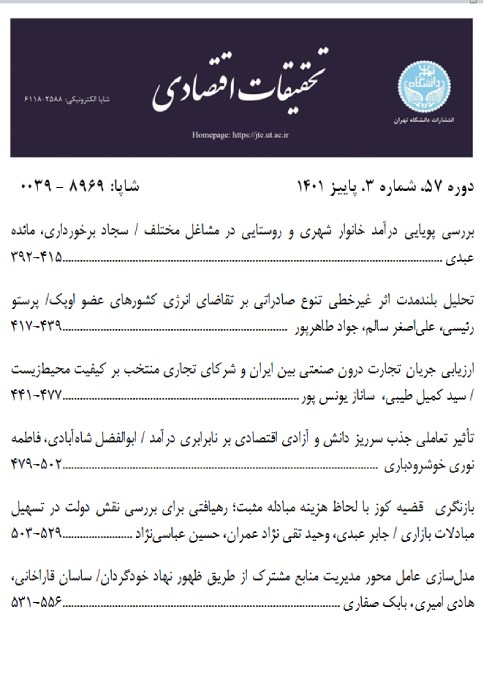Experimental and Theoretical Study of the Effect of Property Right on Intertemporal Behavior
Author(s):
Abstract:
Empirical and experimental studies show that time preferences for long run are smaller than for short run. In the other word individuals in their intertemporal behavior are present bias. So the saving level becomes less than its optimal level. In this study, we assume that property right could eliminate deferent transaction cost between consumption and saving. We investigated our hypothesis by experimental method. In our experiment, 130 students participated and they answered the "MPL" tests in two group. The first group had not receive commitment. We gave the second group commitment about payment. And found time inconsistent behavior in both groups. The parameter of long run time preference was the same in both first and second group. But the present bias parameter was smaller for the first group. This means that those who have received commitment are less present bias in their intertemporal behavior.
Keywords:
Language:
Persian
Published:
Journal of Economic Research, Volume:52 Issue: 120, 2017
Pages:
527 to 549
magiran.com/p1745473
دانلود و مطالعه متن این مقاله با یکی از روشهای زیر امکان پذیر است:
اشتراک شخصی
با عضویت و پرداخت آنلاین حق اشتراک یکساله به مبلغ 1,390,000ريال میتوانید 70 عنوان مطلب دانلود کنید!
اشتراک سازمانی
به کتابخانه دانشگاه یا محل کار خود پیشنهاد کنید تا اشتراک سازمانی این پایگاه را برای دسترسی نامحدود همه کاربران به متن مطالب تهیه نمایند!
توجه!
- حق عضویت دریافتی صرف حمایت از نشریات عضو و نگهداری، تکمیل و توسعه مگیران میشود.
- پرداخت حق اشتراک و دانلود مقالات اجازه بازنشر آن در سایر رسانههای چاپی و دیجیتال را به کاربر نمیدهد.
In order to view content subscription is required
Personal subscription
Subscribe magiran.com for 70 € euros via PayPal and download 70 articles during a year.
Organization subscription
Please contact us to subscribe your university or library for unlimited access!


